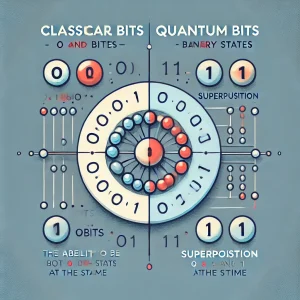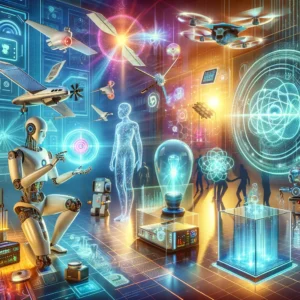
What Is Quantum Computing? An Easy Explanation

Introduction
What Is Quantum Computing? An Easy ExplanationI.
In recent years, the term “quantum computing” has popped up everywhere—from tech blogs to news headlines. But what exactly is quantum computing, and how does it differ from the regular computing we know today? Understanding quantum computing is key to grasping the future of technology, as it promises to revolutionize fields like cryptography, artificial intelligence, and more. Let’s break down the basics of quantum computing in easy terms, so you can see why it’s such a game-changer.
What is Quantum Computing?
Quantum computing is a type of computing that uses the principles of quantum mechanics—the fundamental theory in physics that describes nature at the smallest scales, such as atoms and subatomic particles. Traditional computers use bits, which are binary and represent either a 0 or a 1. Quantum computers, however, use quantum bits, or qubits, which can represent 0, 1, or both at the same time due to a property called superposition.
The Basics: Bits vs. Qubits
1. Classical Bits: In a traditional computer, information is processed in bits, which are binary values (0 or 1).
2. Quantum Bits (Qubits): In a quantum computer, qubits can exist in multiple states simultaneously. This allows for an exponentially higher processing capacity than classical computers.
READ ALSO:
Augmented Reality vs. Virtual Reality: Key Differences and Applications
—
—
Key Quantum Principles: Superposition and Entanglement
Understanding two core concepts—superposition and entanglement—can give us insight into how quantum computing works.
Superposition: Beyond Binary Choices
Superposition allows qubits to be in a combination of states. In classical computing, each bit can only hold a value of either 0 or 1. But with superposition, a qubit can be both 0 and 1 at the same time. This feature gives quantum computers the ability to handle more data simultaneously, leading to faster processing times for certain types of problems.
Entanglement: Quantum Connection
Entanglement is a unique quantum phenomenon where two qubits become linked. When qubits are entangled, the state of one qubit will instantly influence the state of the other, regardless of the distance between them. This property is crucial for the speed and power of quantum computers because it allows for coordinated processing of information in ways that classical computers cannot achieve.
Why is Quantum Computing Important?
The most significant advantage of quantum computing is its ability to solve complex problems much faster than classical computers. This capability is especially valuable in fields such as:
1. Cryptography: Quantum computers could break encryption methods currently used in cybersecurity, but they also offer new methods for secure communication.
2. Drug Discovery and Healthcare: By simulating molecular interactions, quantum computers could accelerate drug discovery and enable more personalized medicine.
3. Artificial Intelligence and Machine Learning: Quantum computing can process large data sets more efficiently, which is essential for AI and machine learning algorithms.
4. Climate Modeling and Forecasting: Quantum computers have the potential to improve our ability to model complex environmental processes, which is crucial for tackling climate change.
How Does Quantum Computing Work?
The hardware for quantum computers is entirely different from classical computers. While traditional computers rely on silicon-based chips, quantum computers use qubits, which are usually subatomic particles like electrons or photons. To maintain the delicate quantum state of qubits, they must be kept in extreme conditions—typically close to absolute zero temperatures.
Quantum Gates and Algorithms
Quantum computers use quantum gates to manipulate qubits in specific ways. These gates control the interactions between qubits, allowing them to perform calculations. Quantum algorithms, like Shor’s algorithm (for factorizing numbers) and Grover’s algorithm (for searching unsorted databases), are examples that showcase quantum computing’s potential to surpass classical algorithms in specific applications.
Current Limitations of Quantum Computing
Despite the promise, quantum computing is still in its infancy, and there are significant challenges:
1. Error Rates: Qubits are highly sensitive to environmental interference, leading to errors.
2. Scalability: Building large-scale quantum computers is difficult due to the fragile nature of qubits.
3. Cost and Complexity: The hardware needed for quantum computing is costly and requires advanced technologies to maintain the quantum state.
Quantum Computing vs. Classical Computing: Key Differences
Quantum computing won’t replace classical computing but will work alongside it, optimizing specific tasks that are too complex for traditional machines.
Companies Leading in Quantum Computing
Several tech giants and startups are pioneering advancements in quantum computing, including:
1. IBM: Known for its IBM Quantum Experience, a cloud-based platform for quantum experimentation.

2. Google: Achieved “quantum supremacy” by demonstrating a quantum computer solving a specific problem faster than a classical computer.
3. Microsoft: Developing a scalable quantum computer based on topological qubits.
4. D-Wave: Focuses on quantum annealing, a specific approach to quantum computing.
The Future of Quantum Computing
Quantum computing has the potential to revolutionize industries, but practical applications are still emerging. The field will likely impact cryptography, artificial intelligence, materials science, and more. However, researchers are still overcoming challenges related to stability and error correction in qubits. In the next decade, we might see quantum computing play an increasingly integral role in solving real-world problems.
Conclusion
Quantum computing represents a monumental shift in the way we approach complex problems. While it may not yet be ready for mainstream applications, the potential is undeniable. Understanding the basics of quantum computing helps us appreciate the possibilities it holds for the future of technology, science, and industry. Whether you’re a tech enthusiast or a professional, keeping an eye on the developments in quantum computing is well worth it.
Ready to dive deeper? Quantum computing is evolving quickly, and staying updated on its progress could open doors to understanding the next major leap in technology.





